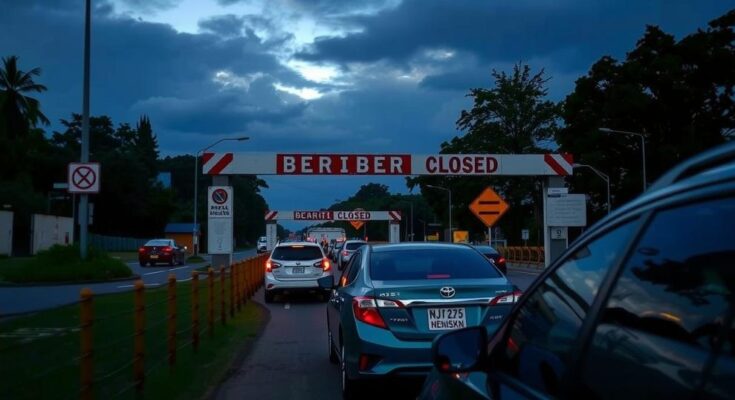South Africa has shut the Lebombo border crossing with Mozambique amid escalating protests following a disputed presidential election. Violent clashes have resulted in fatalities and significant unrest within Mozambique. The South African authorities have advised travelers to seek alternative routes while ensuring the safety and security of the border.
South Africa has temporarily closed the Lebombo border crossing with Mozambique due to escalating violence stemming from post-electoral protests in the neighboring nation. The unrest has erupted following a disputed presidential election, resulting in fatal clashes across various cities. Reports indicate that vehicles have been set ablaze on the Mozambican side of the crossing. “Due to these security incidents and in the interest of public safety, the port has been temporarily closed until further notice,” stated South African border officials. The Lebombo port, located approximately 110 kilometers from Maputo, serves as a significant transit point in southern Africa. Authorities have advised travelers to use alternate crossing routes while they implement safety measures to prevent possible spillover of unrest into South Africa. Despite the South African side remaining unaffected, officials emphasize the necessity of border security and the protection of travelers. Further complicating the situation, violent protests have engulfed Ressano Garcia, a locality adjacent to Lebombo. Michael Masiapato, the commissioner of South Africa’s Border Management Authority (BMA), expressed concerns regarding security despite the apparent calm on the South African side. Reports indicate that protesters have vandalized an immigration facility on the Mozambican side. In a remarkable turn of events, several Mozambican officials have sought refuge in South Africa for their safety amid the turmoil. Protests began following the declaration of Daniel Chapo from the ruling Frelimo party as the election victor with over 71% of votes. Opposition leader Venâncio Mondlane, having secured 20% of the votes, has since gone into hiding, fearing for his life. The unrest has led to violent confrontations with law enforcement, resulting in numerous fatalities, according to Human Rights Watch. The situation remains tense with government officials imposing restrictions on internet access and social media to curb further unrest, while Mondlane has called for a continuous general strike. Defense Minister Cristovao Chume has issued warnings regarding the potential deployment of military forces ahead of anticipated national demonstrations. Chume alleged that the protests aim to undermine the democratically elected government. The unfolding events in Mozambique merit close observation as they could impact regional stability and cross-border relations with South Africa.
The closure of the Lebombo border crossing is a direct response to violent protests in Mozambique triggered by a contentious presidential election outcome. These protests reflect deep-seated tensions within the country, primarily between the ruling Frelimo party and opposition forces. The unrest has led to violent confrontations, loss of life, and significant public disorder, raising concerns about security not only within Mozambique but also for neighboring South Africa, which plays a crucial role in regional trade and movement.
In summary, the temporary closure of the Lebombo border crossing underscores the critical security concerns arising from the violent post-electoral climate in Mozambique. The situation points to a broader context of political unrest and challenges facing the Mozambican government, particularly in preserving public order and ensuring safety for citizens and neighboring states. Ongoing developments warrant careful monitoring as the region confronts the potential ramifications of civil unrest.
Original Source: www.bbc.com




